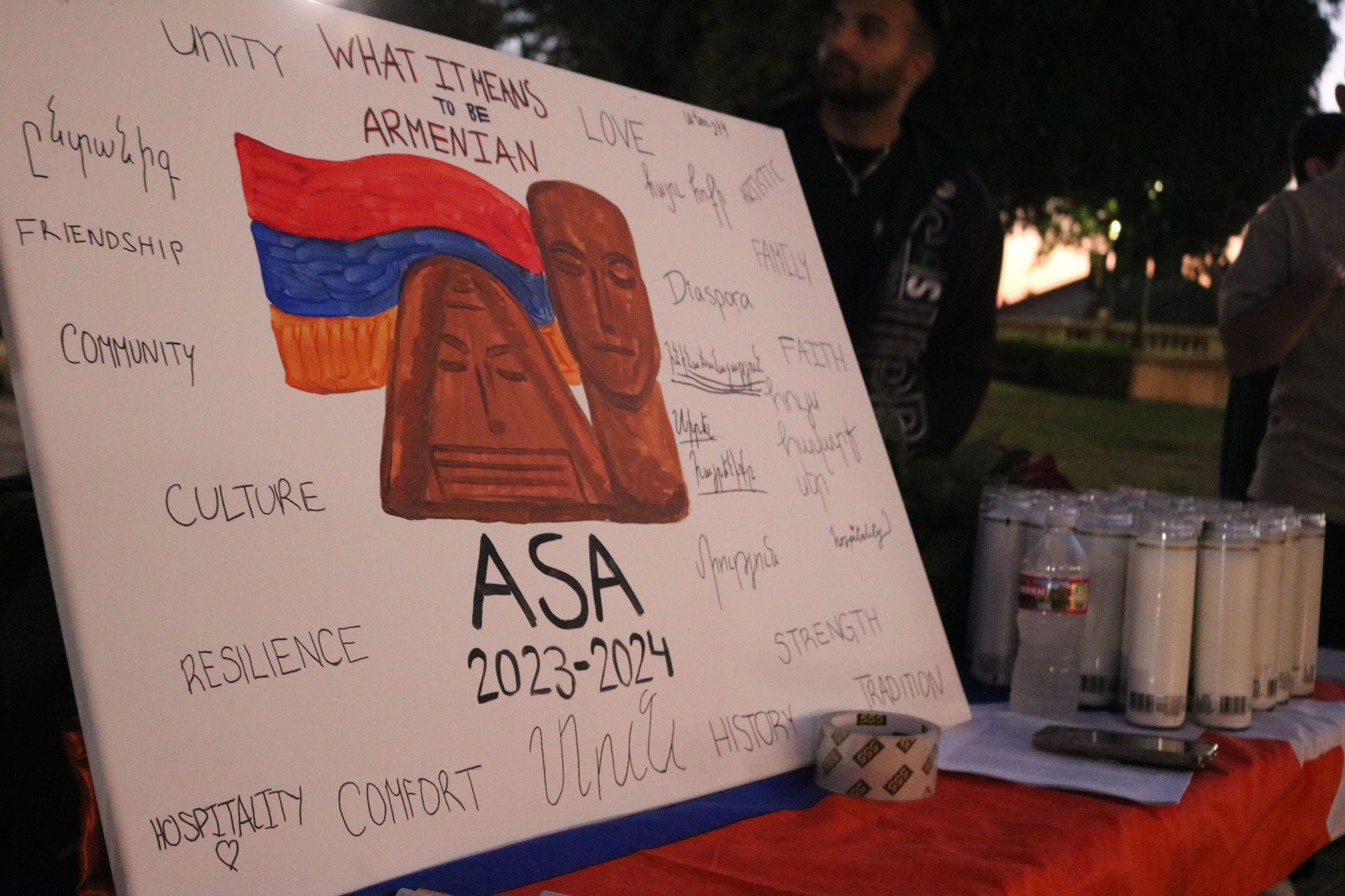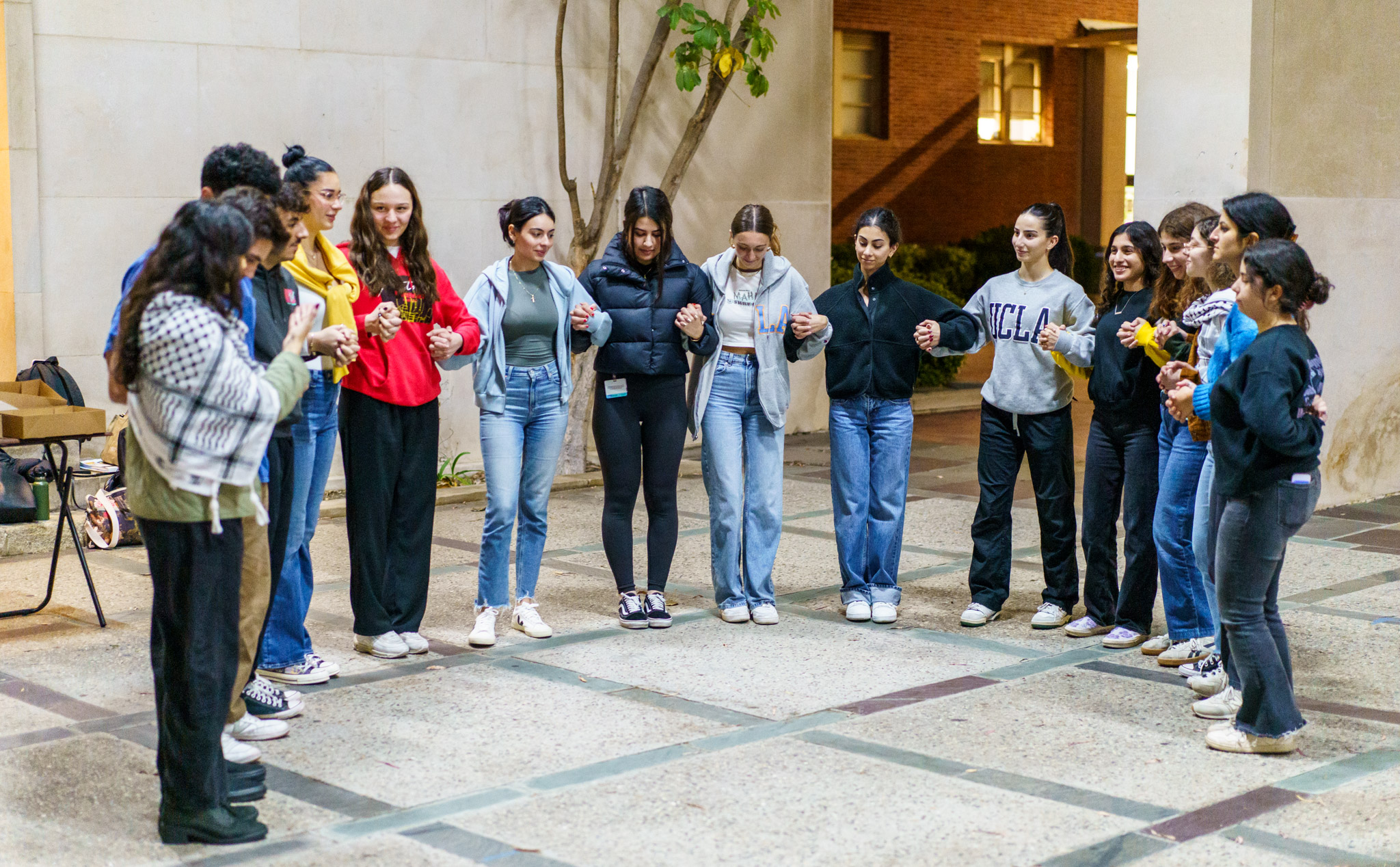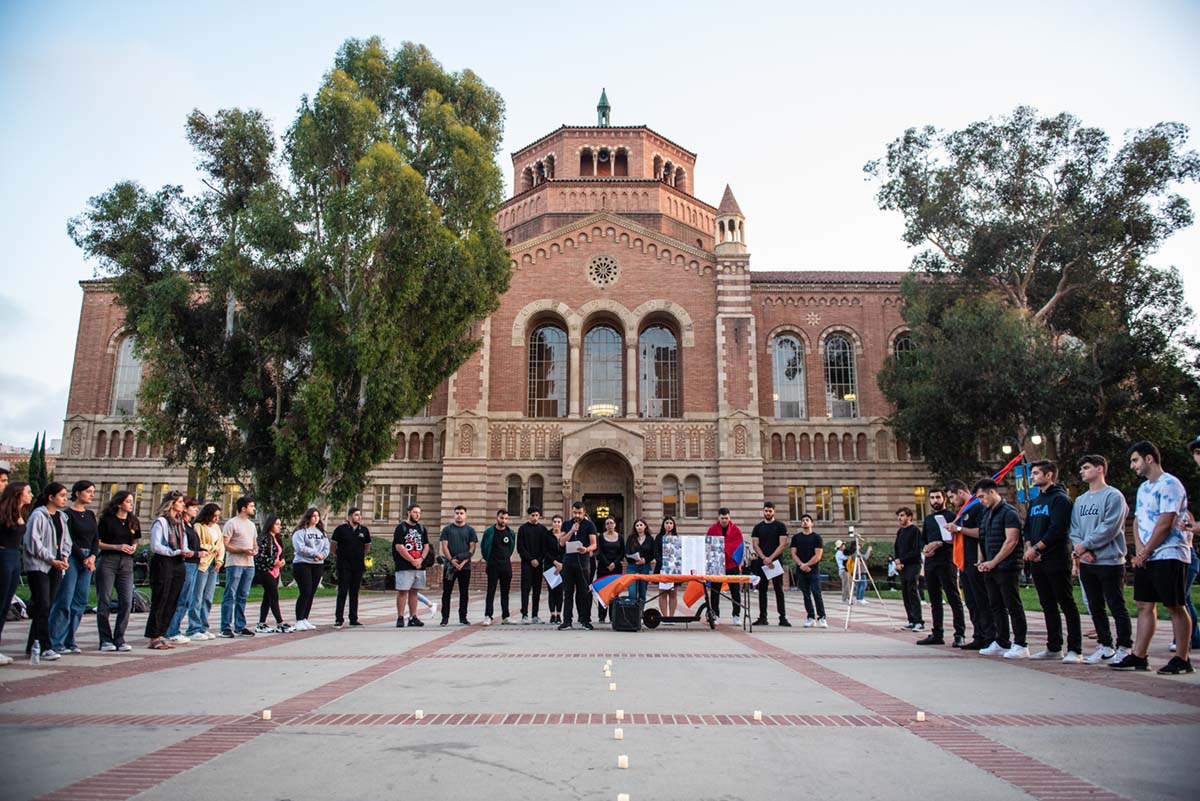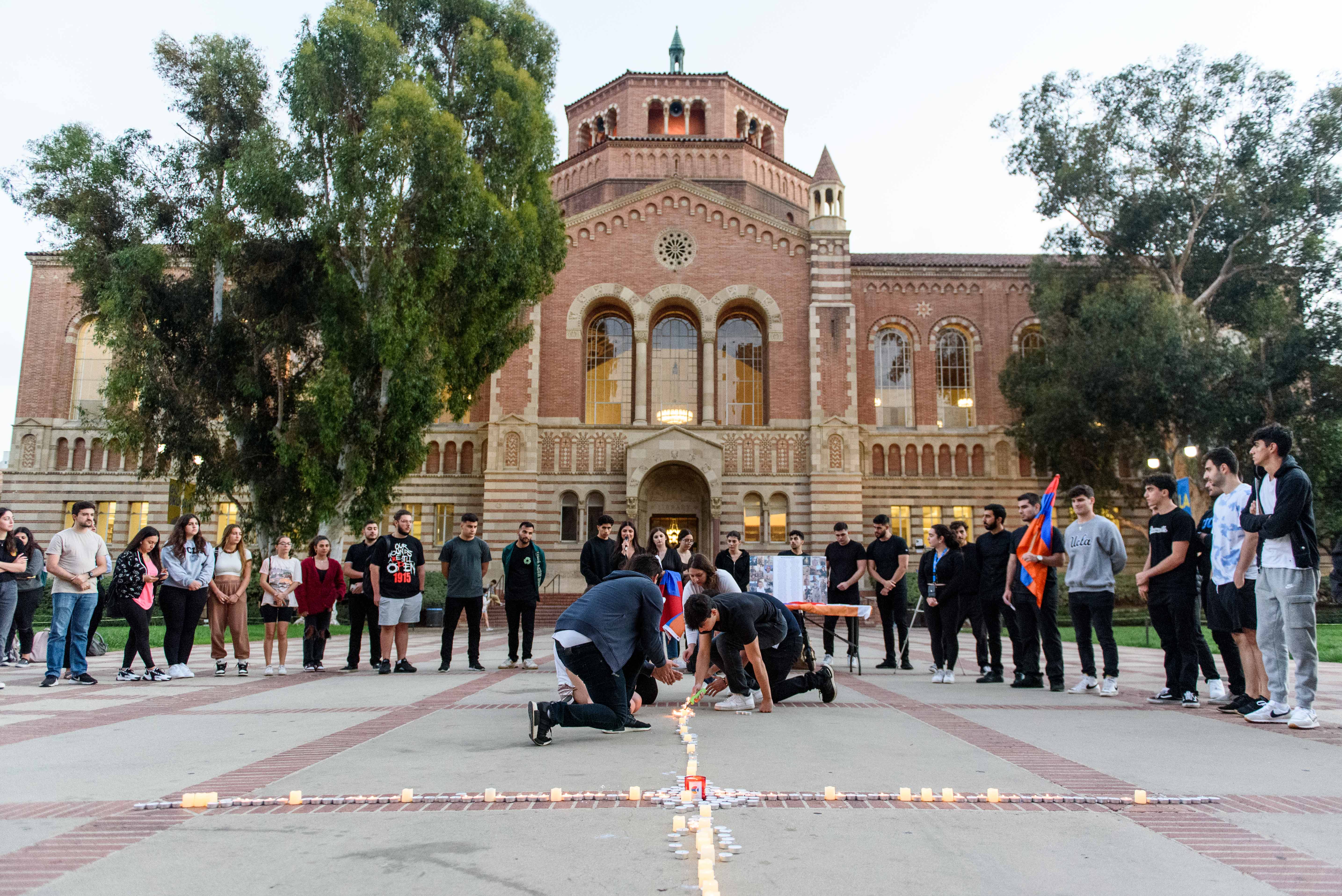Opinion: Armenian cultural week is an important tribute to resilience, identity
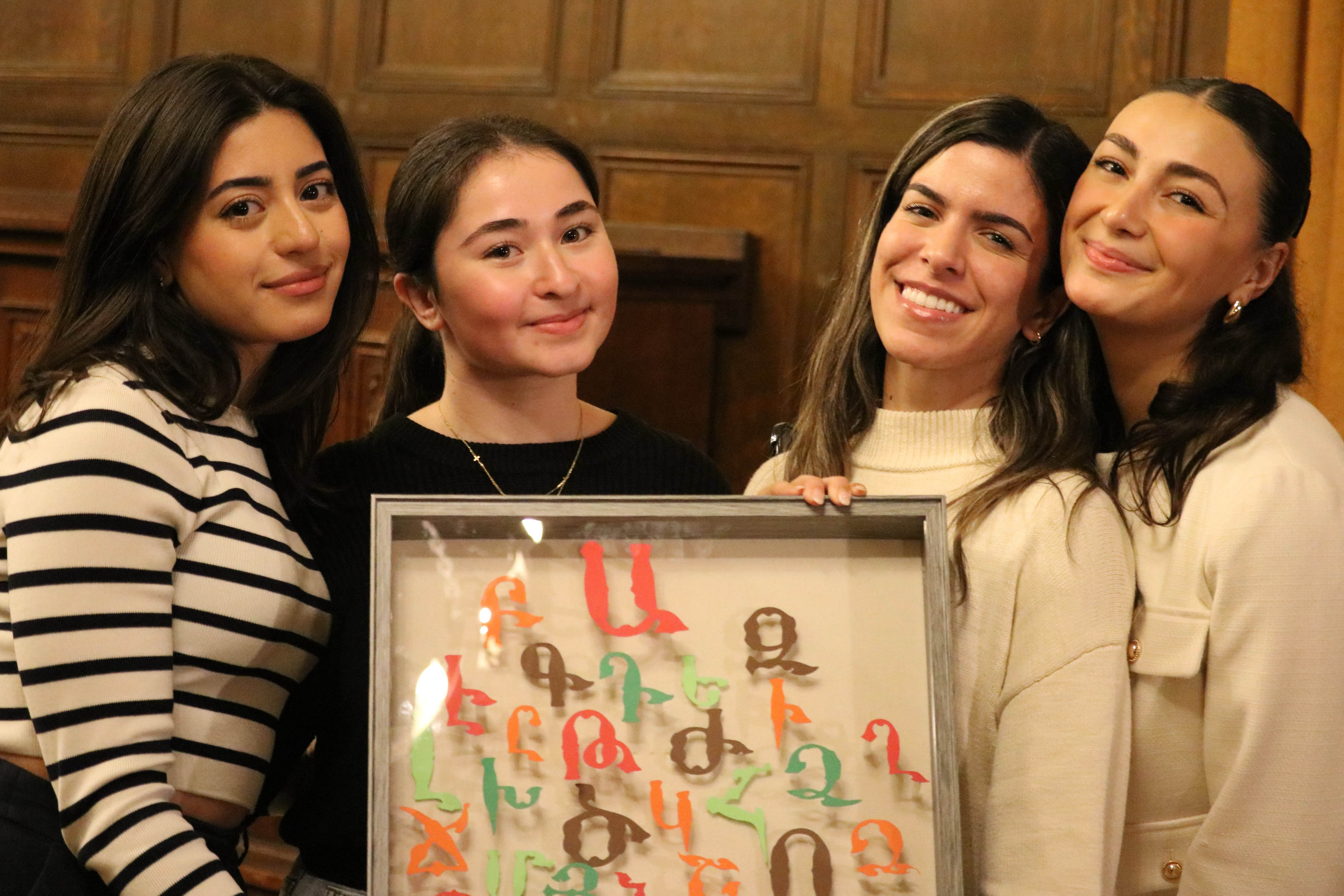
Members of the Armenian Students’ Association pose for a portrait at an art auction held during the “Unplugged” event the organization hosted as part of its annual Armenian heritage week. (Courtesy of Rita Keushkerian)
By Mireille Karadanaian
April 16, 2024 11:38 p.m.
Sona Nalbandian is performing “Kamancha” on the aptly named four-stringed instrument, the kamancha.
As the fourth-year ethnomusicology student plays, I feel the history of an entire people in the rippling vibrations of the strings. Despite being written in the 18th century, the song’s haunting yet comforting melody is a reminder of the struggles the Armenian people have endured and overcome, their rich culture prevailing despite it all.
While too vast to fit into the span of five days, Armenian culture was celebrated and shared with UCLA during an annual cultural week in March. The Armenian Students’ Association, the Hidden Road Initiative and the Undergraduate Students Association Council organized a week’s worth of activities featuring Armenian food, dance, music, art and traditions to honor their cultural heritage and introduce it to students on campus.
As someone of Armenian descent, this cultural week at UCLA is more than an amalgamation of talented performances and fundraisers. It serves as a reminder of the healing power that the celebration of culture can have on ethnic identity.
The unifying and inspiring effects of these events on the Armenian student population are clear. ASA and HRI brought customs to life and left a lasting impression of their underappreciated beauty with support from USAC President Naomi Hammonds.
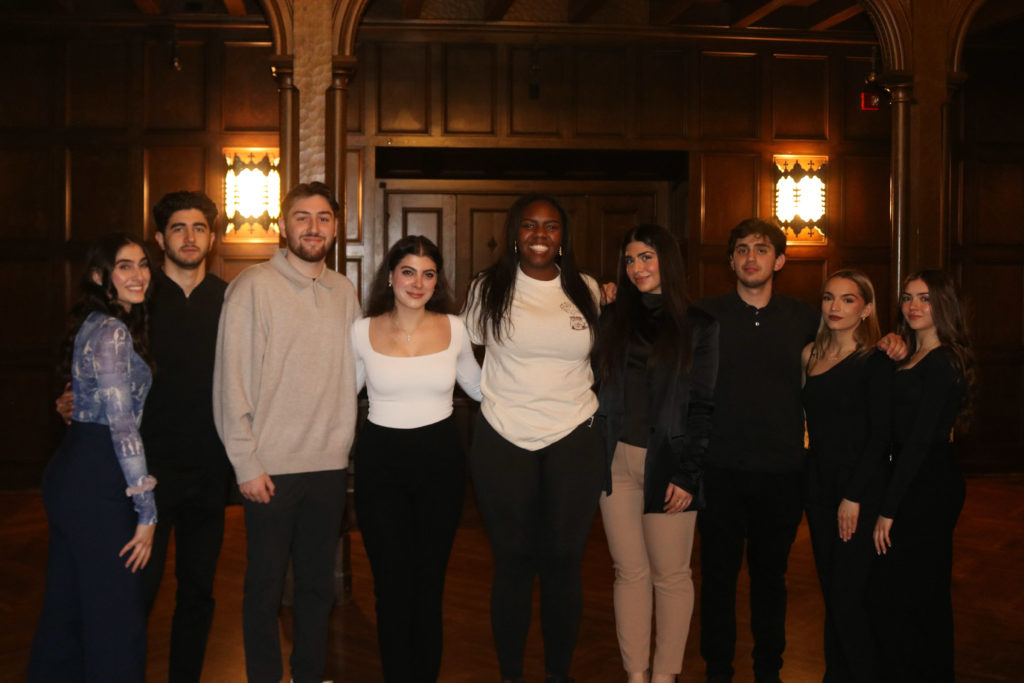
On March 4, ASA members showcased their talents at Kerckhoff Grand Salon’s “Unplugged” event featuring poetry readings, choreographed dances, and vocal and instrumental renditions. An auction of Armenian art followed, and proceeds went to HRI’s efforts for students in Armenia.
Hayk Gargaloyan, a second-year mathematics of computation student, played a medley of Sayat-Nova songs with his duduk, a traditional Armenian double reed instrument.
Gargaloyan’s rendition inspired the same melancholic hope and romantic expressionism as Sayat-Nova, a famous Armenian musician from the 18th century. This highlighted not just the value of music but the importance of telling a story, even hundreds of years later.
Gargaloyan accomplished the goal of “Unplugged” – to preserve the memory and beauty of pieces of Armenian history.
Lilia Hovsepyan, the cultural chair of ASA and a fourth-year philosophy student, showcased what being Armenian meant to her through a bemakan par dance called “Gharabaghi Aghjikner.”
“It’s truly an honor to have knowledge of Armenian dance,” Hovsepyan said.
The dance was an interpretation of characteristics many girls in the Armenian de facto state of Artsakh or Nagorno-Karabakh have, leaning into their fun, carefree and adventurous nature. The shift from slow, graceful extensions of the arms and hands to fast-paced, eager jumps and twists paid homage to this often overlooked aspect of Kharabakhci identity.
I felt my personal struggles as an Armenian woman echoed in her dance.
Armenian women are often held to an impossible and narrow standard of femininity based on outdated and patriarchal roots. We can’t be loud or exuberant, but we also can’t be too timid. We can’t be strong and stoic, but we also can’t be too emotional. We can’t explore our sexuality, but Armenian men are encouraged to do so.
During Hovsepyan’s dance, these dichotomous expectations were overpowered by the fiery spirit of the Kharabakhci girls. I’m confident everyone in the audience was equally captivated.
On March 5, a poetry workshop shared the poems and stories published by students in Artsakh. Sofia Gevorgian, co-president of HRI and second-year Middle Eastern studies and political science student, said how important it can be for native Armenians and those across the diaspora to exchange words and stories with one another.
“We are Armenian, just from the U.S., and we all have this connection to this whole separate world, but it’s actually not separate,” Gevorgian said. “The only way for us to feel a natural connection to this country (Armenia) is to collaborate with and hear from those who are currently living there.”
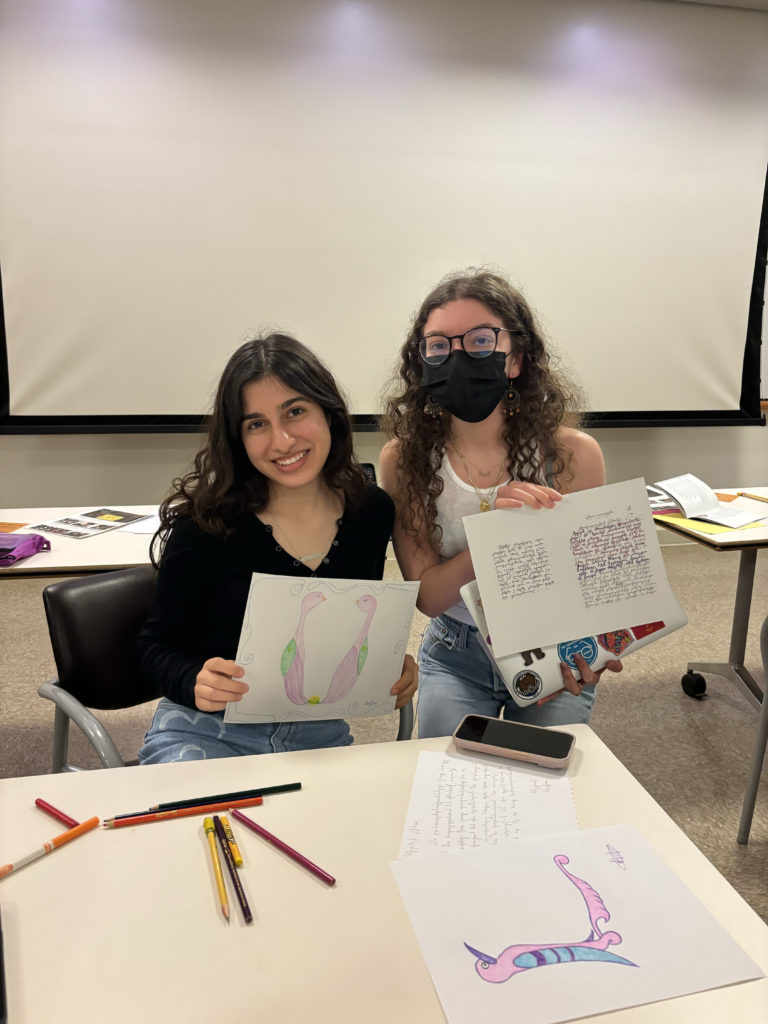
Whether it may be through writing letters, sending emails or sharing poetry, I was moved by the efforts of students on campus to connect to their Armenian roots. And if one was inspired by the tenacity of young and burdened children in Artsakh, one could write and send a poem back to them as well.
March 6 was a dance workshop with trained professionals teaching students the different types of Armenian dance – from solo, modern ones like bemakan to traditional group dances like shurchbar or shalakho. The next day, students made custom tote bags with Armenian symbols and art embossed on them.
On March 8, ASA hosted my favorite event, which was a potluck outside of Kerckhoff Hall with Armenian foods and delicacies, along with roses to commemorate International Women’s Day. This event provided Armenians with a chance to celebrate every woman, especially family members that have shaped who they are.
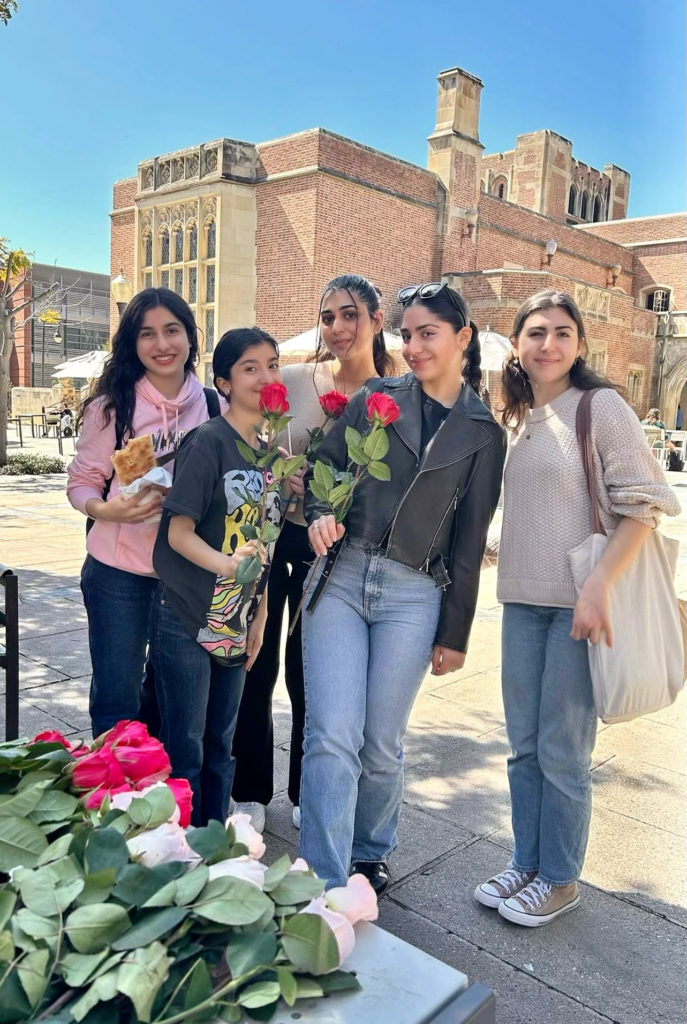
“For people in Armenia, they show their love to all the women in their life, not just their life partner, which I think is so special,” Hovsepyan said.
Red roses were distributed to anyone who wanted to celebrate, and dozens of bouquets were shared in just a matter of minutes. Many onlookers even tried traditional Armenian food at the table, leaving with appreciation in their bellies and minds.
“We had lahmajun, spicy boreks, gata. We just explained what the food was, what it means to us, how these are an essential part of Armenian cuisine and Middle Eastern cuisine in general,” Hovsepyan said.
For Lusin Yengibaryan, the vice president of ASA and a fourth-year psychobiology student, this was the highlight of the week.
“Doing these events in public spaces like Kerckhoff Grand Salon, Kerckhoff Patio and other spaces on campus … where students come on a daily basis, … they’re able to absorb some of our culture and learn something about Armenians throughout their daily tasks,” Yengibaryan said.
This positively widened the scope of Armenian reach, facilitating interactions between multiple rich and diverse communities.
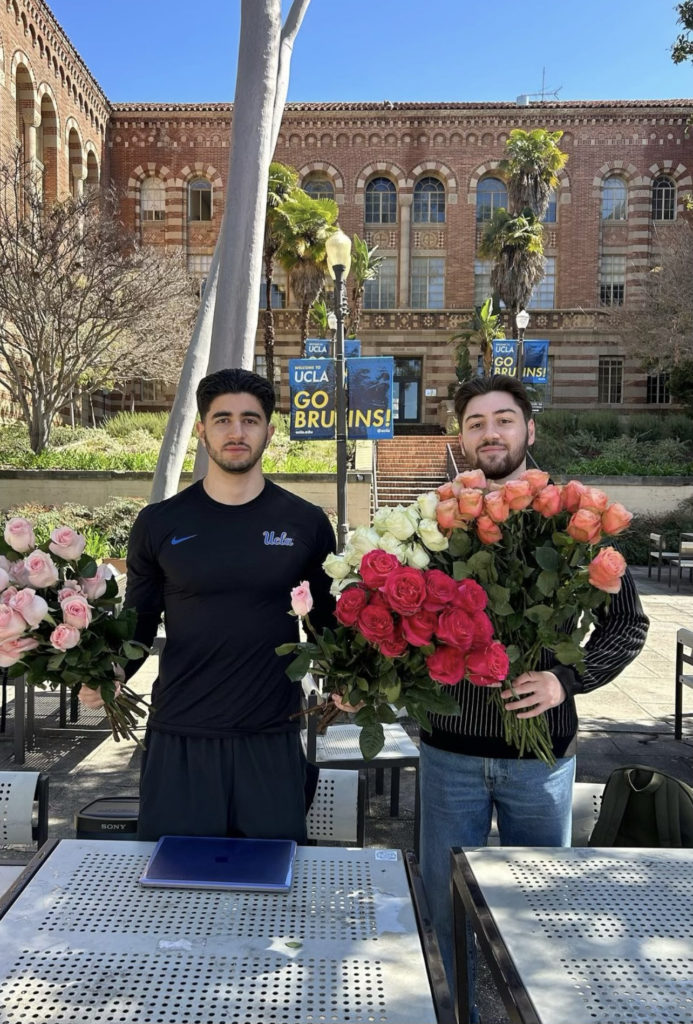
Recently, Hammonds spearheaded the unanimous passage of a resolution drafted by Armenian student leaders that called on UCLA’s administration to take proactive steps in showing solidarity with Armenia after the recent conflict between Azerbaijan and Nagorno-Karabakh.
Mischa Gureghian Hall, the political affairs chair of ASA and a fourth-year global studies student, said this resolution pushed not only for more transparency about UC investments but also the crucial divestment from groups hurting the same civilians who are still facing the ramifications of the Armenian genocide and the Nagorno-Karabakh War.
“Our USAC resolution is really meant as a powerful symbolic gesture,” Gureghian Hall said. “Even if the land of Nagorno-Karabakh is no longer inhabited by Armenians, its inhabitants won’t be forgotten, and its inhabitants are still a distinct population, they’re still a distinct peoples with a distinct ethnic homeland.”
The convergence of ideas from student leaders across UC campuses is a testament to the power and strength of recognizing peoples and their cultures. For students living in Armenia with a lack of access to proper resources and education, or those fighting a war in the shadows of dirty politics and warped truths, this progress is invaluable.
This prompts a discussion on the pressure and privilege that anyone, including non-Armenians, who is a part of a diaspora may feel. There is a daily struggle to take advantage of the opportunities this country may provide but also the pressure to honor one’s ethnic home and culture. The solution lies in using these endless possibilities as a stepping stone for change and as a credit to a culture and upbringing outside the United States.
“Our culture is not only just about the sad events that happen or the wars,” Yengibaryan said. “We are able to fight through it and get through it and still maintain our culture, maintain our food, maintain our dance, maintain our song, maintain our happiness and maintain our positivity throughout it all.”
Cultural weeks like ASA’s are key to achieving a warm feeling of home. We may not be in the place our ancestors were born, and we may not directly feel the impact of the Armenian struggle and pain, but we hold a faith and determination to learn, grow and share what it means to be Armenian.
For now, that is enough.



